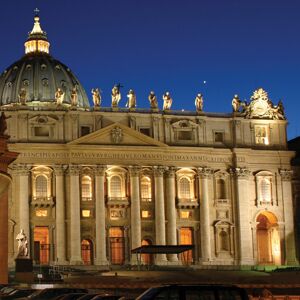
Financial Crisis—Vatican Weighs In
November is a crucial month for the future of the world financial system.
Following a critical meeting of EU heads this week to consider the future of the eurozone, the sixth summit meeting of heads of government of the G-20 nations (the world’s richest economies) is due to take place in Cannes, France, on November 3-4. This summit is convening to discuss issues related to finance and the global economy at a time when the global financial system threatens to unravel.
Realizing the vital nature of the matters the G-20 will discuss, the Vatican is entering the ring with a call for a return to the old Holy Roman imperial approach to financial governance.
This move is one further step toward the fulfillment of the great prophecy for our times penned by the Apostle John under divine inspiration almost 2,000 years ago. That prophecy, contained in the 13th chapter of the book of Revelation, speaks of a time when a great religious institution will hold powerful sway over a northern European empire to the extent of imposing its will on global trade and finance.
With that prophecy in mind, it is extremely interesting to consider the following statement released Monday by the Vatican Information Service (vis): “This morning in the Holy See Press Office, a press conference was held to present a note from the Pontifical Council for Justice and Peace entitled: ‘Towards reforming the international financial and monetary systems in the context of a global public authority.’”
The note was presented by Cardinal Peter Kodwo Appiah Turkson and Bishop Mario Toso.
In relation to the current global financial crisis, vis quoted Cardinal Turkson as stating that the pope and “the Holy See are following these matters with particular concern, constantly calling not just for ‘joint action’, but for ‘examination of every facet of the problem: social, economic, cultural and spiritual’. It is in this spirit of discernment that the Holy See, with the note of the Pontifical Council for Justice and Peace, wishes to make a contribution which might be useful to the deliberations of the G-20 meeting.”
The article quoted Bishop Toso as explaining that the aim of the note is to “suggest possible paths to follow, in line with the most recent social Magisterium, for the implementation of financial and monetary policies … that are effective and representative at a global level.”
In the document, the Vatican highlights religion as being necessary to instituting a successful global financial system, pointing to the current crisis in the system as being due to conflicting modern ideologies that have replaced the old Holy Roman underpinnings of the whole global system. “Bishop Toso spoke of the need to overcome these ideologies by ‘a new global humanism, open to transcendence, … an ethic of brotherhood and solidarity [all Roman Catholic ideals], and by subordinating economy and finance to politics, which is responsible for the common good’” (ibid., emphasis added throughout).
In a startling statement confirming that Rome is now weighing in heavily on seeking to influence the outcome of deliberations on the global financial crisis, vis declared that:
The Pontifical Council for Justice and Peace, drawing from the social Magisterium of recent Pontiffs, particularly John xxiii and Benedict xvi, proposes “that globalization be regulated by a global public authority,” Bishop Toso explained. The council also suggests the reform of current international institutions. … “They must be ‘super parties,’ at the service of the universal good, capable of offering effective guidance and, at the same time, of allowing each country to express and pursue its own common good, according to the principle of subsidiarity and in the context of the global common good. Only in this way will international institutions manage to favor effective monetary and financial systems ….”
That document is strongly and very traditionally Roman Catholic in its terminology relating to financial, economic and political governance.
Confirming the Vatican view that the global financial system must be ruled by a supranatural power holding the moral high ground, vis quoted spokesman Toso as declaring that this global authority “must see its power to lead and to decide—and to impose penalties on the basis of the law—as a form of service to the various members states, a way of ensuring that they possess efficient markets.”
Bishop Toso concluded, “It is necessary to restore the primacy of ethics and, therewith, the primacy of politics, which is responsible for the common good.”
It takes little imagination for an open mind to read into those statements Vatican machinations leading toward the Vatican’s revival as the “ethical” arbiter of an old institution given to the “primacy of politics,” claiming responsibility “for the common good,” a literal resurrection of the old Holy Roman imperial system that once dominated the world for a thousand years.
The drive to resurrect that old system has been a consistent theme in the Magisterium of Rome, from Pope Leo xiii’s encyclical “Rerum Novarum,” issued in 1891 during the sixth resurrection of the Holy Roman Empire, to Pope Benedict’s “Caritus in veritate,” issued in 2009—the year that the Lisbon Treaty/EU constitution, the current governing instrument of the 27-nation European Union, which is the seventh and final resurrection of the Holy Roman Empire, was signed.
That theme will soon find its reality in the fulfillment of a startling prophecy for our day, when that same old Holy Roman system “causeth all, both small and great, rich and poor, free and bond, to receive a mark in their right hand, or in their foreheads: And that no man might buy or sell, save he that had the mark or the name of the beast, or the number of his name” (Revelation 13:16-17).
